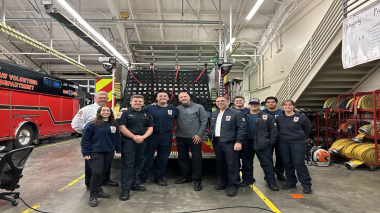It wasn’t kidney stones after all.
When Bill Briggs went to the emergency room in January 2018, he expected it would be a trip to treat kidney stones. Instead, the visit led to a prostate-specific antigen (PSA) test, which screens for prostate cancer. A PSA result less than 4 is normal in most circumstances, and 4 to 10 indicates a heightened risk of prostate cancer. A result of 10 through 20 could mean removing the prostate. Bill’s result was 1,037 – and further testing showed that he had metastatic prostate cancer that had spread to his lymph nodes, bones and bladder.
Bill received this news shortly after he retired from a career as a therapist specializing in substance use disorder. He remembered the advice he offered clients who faced seemingly impossible challenges on the road to recovery from addiction.
“Part of my job was to show people this is not the end, and they can surely recover,” Bill says. “When this disease hit me, it was only right to ask myself the same question that I asked my clients: ‘How can I find purpose in this?’”
Choosing a treatment path
With cancer as advanced as his, Bill said he needed the “best of the best” medical team. And as he’d encouraged his clients to do, he took an active role in his recovery.
Bill began to research all he could about prostate cancer – treatments, new advancements and cutting-edge clinical trials. He joined a prostate cancer support group to learn from others who were on similar paths. There, his new friends suggested finding a cancer treatment center renowned for both its research and care. Although he lives in the Charlotte area, Bill was willing to travel for the best care – to Durham, Baltimore, Houston, anywhere. Then friends from support groups in two different cities suggested a cancer specialist right in Charlotte: Earle Burgess, MD, an oncologist at Atrium Health’s Levine Cancer Institute.
Bill came to Dr. Burgess with many questions about emerging treatments. Dr. Burgess and his team spent more than an hour and a half with Bill and his wife, answering their questions and explaining all of Bill’s options.
“Dr. Burgess had such compassion and professionalism when he laid out my options, one of them being a clinical trial. I instantly felt comfortable, and we had conversations about treatments. He didn’t talk to me like he was up on a pedestal,” Bill says. “That human touch is so important in the medical field, and it was there with Dr. Burgess 100 percent.”
Bill chose to enter a clinical trial led by Dr. Burgess, a research study that gives patients access to cutting-edge treatments before they're widely available. During this trial, Bill was given hormone therapy, chemotherapy and an anti-androgen medication at the same time, rather than the standard approach of providing them separately.
Bill experienced some fatigue during chemotherapy, but the side effects of the drugs were far less severe than he expected. He grew close to Dr. Burgess and his entire team, who were generous with their time, their expertise and even their hugs.
“I would’ve traveled to any hospital in any city to get the best of the best,” Bill says. “But oh my gosh, I could go to an excellent hospital right in my backyard. That’s huge. I’m really grateful to Atrium Health for having these doctors who specialize in prostate cancer. To have Levine Cancer Institute so close by is a real gift.”
As he went through treatments, Bill discovered the purpose that he sought in his cancer diagnosis. He decided to give back to others, becoming a leader of a prostate cancer support group. His new mission is to support other men as they cope with prostate cancer and to help them navigate the same path that others helped him navigate.
Bill added he is so grateful to his support system – his family and friends – and especially his wife Susan for their support during his treatment.
One year later
Nearly one year after Bill began the clinical trial, he had another PSA test. His previous level of 1,037, which indicated extensive and widespread cancer, had lowered to 0.1, which indicated nearly undetectable levels of cancer. The news was unbelievably exciting to say the least.
“This clinical trial is truly groundbreaking. There is no other active trial in the U.S. that combined these three drugs at the same time,” Bill says. “It feels great to contribute to research that will help thousands and thousands of other men in the future. If I could get to 0.1, wouldn’t it be great if everyone else could?”
To learn more about prostate cancer care at Levine Cancer Institute, please call 980-442-6410.



